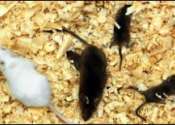Drug that targets key mutation found to shrink some tumors
A team of researchers affiliated with several institutions in the U.S. and Australia (and sponsored by pharmaceutical company Amgen Research) has found that a drug they optimized to target a protein produced due to mutations ...







